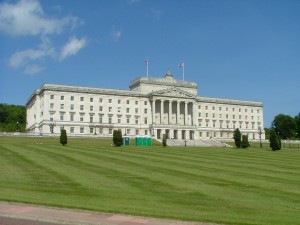 Northern Ireland Assembly, 10 February 2008
Northern Ireland Assembly, 10 February 2008
Mr B Wilson: The Executive’s five-point strategy includes the objective of protecting and enhancing our environment and natural resources. The Budget statement proposed to improve the quality ofNorthern Ireland’s natural and built environment and heritage, and to reduce our carbon footprint.
Sustainability was the key theme. Building a sustainable future is a crucial requirement if the Executive’s economic, social and environmental policies are to be realised. To achieve those worthy objectives, additional resources are necessary. However, nothing in the supply figures suggests that those resources will be provided. There has been a long-standing underfunding of environmental issues inNorthern Ireland, and it looks as though the Supplementary Estimates will allow that to continue.
Northern Irelandworkers make significantly less use of public transport than their UK counterparts. In 2004-06, 6% of the population in Northern Ireland used public transport, compared to 12% in the UK. However, the proportion of the DRD budget that will be invested in public transport is due to fall over the next 10 years. If we hope to increase the use of public transport, we must provide additional funding.
The commitment to introduce a rapid transit system is welcome. However, consideration has been given to that project for at least a decade, and work on it will not start until 2011. That proposal was contained in the regional transportation strategy forNorthern Irelandfor 2002-12, and it formed part of the 2002 Programme for Government. Again, funding for it should have been provided. The supply figures should have mentioned that funding in order that the project, which will greatly reduce pollution in the city, might be expedited.
The Green Party is disappointed at the imbalance that exists between capital expenditure on roads and on public transport. By 2010-11, when that imbalance has been somewhat dissipated, we will still be spending 160% more on roads than on the rest of the transportation infrastructure put together.
The Executive’s aim is to reduce the carbon footprint by at least 25% by 2025, but there is no suggestion either of how that can be achieved or of the provision of additional funding. I welcome that objective, but I am concerned that no interim target has been set and that there is no evidence that there has been any change in policy to meet the 2025 target. Such long-term targets are ineffective and will achieve nothing unless they are accompanied both by changes in policy and by adequate funding. To achieve the target, we must get commuters out of cars and on to public transport. However, an examination of the DRD capital investment programme for the next 10 years shows a 4:1 ratio in favour of roads. That differential is increasing. If we are ever to decrease our carbon emissions, we must do more to encourage the use of public transport.
I am also concerned that the budget for the Environment and Heritage Service is being reduced over the next three years, despite our having been assured that that body will be able to carry out the role of the proposed environmental protection agency.
Figures show thatNorthern Irelandalso has the lowest share of electricity that is produced from renewable energy sources — 1·9 % compared to the EU average of 13·7 %. However, there is no obvious additional funding to meet the objective of increasing the use of renewable energy sources.
The Executive state that climate change and rising fossil-fuel prices have focused attention on finding renewable energy sources. Again, the supply figures give no evidence of that.
The most disappointing aspect of the figures is that nothing was included for the renewal of the Reconnect grants. The decision to abolish them and the change in building regulations sound the death knell for many small businesses in Northern Ireland. Over the past two years, DETI has encouraged firms to develop skills in the installation of renewable energy systems. Its staff were encouraged to take courses, which were funded by the Department, at the RenewableEnergyInstallerAcademy. More than 800 installers completed those courses. That meant that an industry that was based in new technology was evolving and students were developing skills that were increasingly in demand, North and South.
However, that developing industry depended on a demand for microgeneration systems. The end of the Reconnect grants and the Minister of Finance and Personnel’s decision to amend building regulations have destroyed that demand. The installers rightly feel betrayed. They argued that they had been let down by the Government and that they wasted time and money in acquiring those skills, only to find no demand for them. Some of the installers even said that they would be forced out of business if the Reconnect grants, or similar support, were not made available immediately.
The decision runs counter to the Executive’s claim that they intend to encourage growth in our indigenous private sector. Northern Irelandis losing small businesses that could develop into much larger ones. That is a betrayal of everyone that is involved in the renewable energy scheme, and I appeal to the Minister of Finance and Personnel to find a way to support the installers. We cannot afford to lose a large number of small businesses that are at the cutting edge of technology.
The Executive claim to be concerned about climate change, but the policies that they intend to implement will have a detrimental effect on the environment. The Executive claim to be green, and to support sustainability, but there is nothing in the Budget to substantiate those claims. In fact, all the evidence is to the contrary. The abolition of Reconnect grants to small renewable energy systems and the reduction in the percentage of the Department for Regional Development’s budget for public transport, together with the Minister of Finance and Personnel’s recent decision to change building regulations so that the inclusion of renewables in new buildings is no longer mandatory have totally negated the Executive’s claim to support sustainability.
